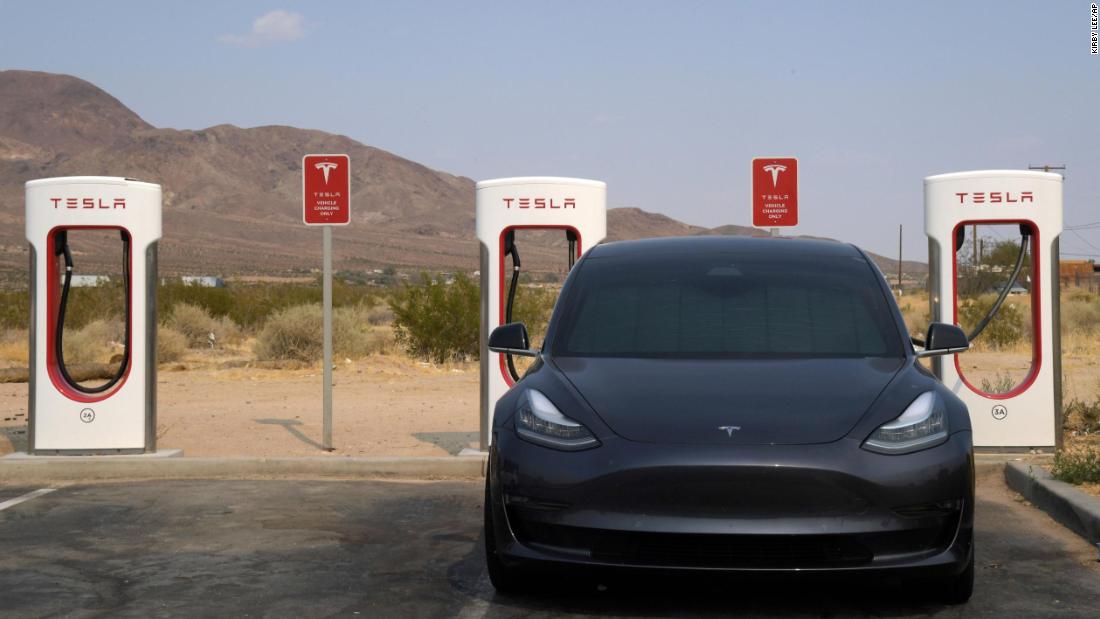
A version of this story first appeared in CNN Business' Before the Bell newsletter. Not a subscriber? You can sign up right here.
But for Tesla (TSLA) to maintain its edge in the increasingly competitive world of electric vehicle production, it will need to keep innovating. Enter Battery Day.
What's happening: CEO Elon Musk has teased major announcements that could be unveiled the company's flashy battery summit on Tuesday.
Any changes to battery efficiency, the cost of production or Tesla's supply chain could be hugely significant for the company, given the importance of batteries in electric vehicle manufacturing and performance.
"Batteries are the hearts and lungs of the Tesla story," Wedbush Securities analyst Daniel Ives told me.
Ives said that Wall Street is looking for Tesla to start producing more proprietary battery technology so they can "own more of their ecosystem."
Watch this space: Musk attempted to tamp down expectations on Monday, tweeting that "what we announce will not reach serious high-volume production until 2022."
He added that the company will not reduce battery purchases from suppliers like Panasonic and LG, given that there could be "significant" battery shortages even with partners going at full speed. Tesla shares fell 4% in premarket trading.
But anticipation is still high. Tesla is the most valuable car company in the world, even though it produces a fraction of the vehicles churned out by other automakers. (In a recent email to employees, Musk said the company was on the verge of a record quarter for car sales. Its all-time high was the 112,000 cars it delivered to customers in the fourth quarter of last year.)
As competition heats up, Tesla benefits from having had a head start, according to Gene Munster of Loup Ventures. Through the first half of 2020, Tesla had roughly 80% of the US market for electric vehicles, as well as a 15% market share in Europe and 20% in China.
But it has target on its back. GM, which has pledged to spend more than $3 billion annually through 2025 to fund electric vehicle research and development, unveiled a competitive battery in March, while companies like Volkswagen are preparing to flood the market with EV models.
Xi Jinping has a message for China's private companies
President Xi Jinping has sent a message to China's private businesses: You can make money, but only if you follow my rules, my CNN Business colleague Laura He reports.
The ruling Chinese Communist Party this month published an unusually frank set of guidelines that calls on its members to "educate private businesspeople to weaponize their minds with [Xi's] socialism ideology."
The private sector needs "politically sensible people," the directive said, who will "firmly listen to the party and follow the party."
Why it matters: The message comes as the world's second-largest economy continues its fragile recovery from the coronavirus pandemic and tussles with the United States over trade and the future of technology. Bringing China's independent-minded private businesses to heel could help speed that recovery, while extending the control of the most powerful leader the country has seen in decades.
The practical effects of the directive aren't entirely clear yet. But the order could push private companies to take public stances on major political or foreign policy issues, such as territorial disputes.
Watch this space: The consequences for stepping out of line can be severe. On Tuesday, the retired real estate tycoon Ren Zhiqiang was jailed for 18 years on corruption charges.
He had earlier allegedly criticized Xi's handling of the coronavirus pandemic — and his sentence appeared designed to send a message that public criticism or defiance of Xi will not be tolerated.
The outlook for the US recovery is getting gloomier
A lot has improved since the darkest days of the coronavirus pandemic. But according to the Back-to-Normal Index created by CNN Business and Moody's Analytics, the recovery appears to be heading in the wrong direction.
At its lowest point in April, the Back-to-Normal Index, which is comprised of 37 economic indicators, estimated the US economy was operating at about 59% of where it had been before the pandemic accelerated in early March.
It slowly improved in May and June as coronavirus cases started moderating, unemployment claims began falling and some states started lifting restrictions on businesses, per my CNN Business colleague Annalyn Kurtz.
But after that, momentum stalled. As coronavirus cases surged in some places, states backtracked on reopening plans. For the last three months, the index shows the economy has largely gone sideways. And after reaching a post-pandemic high of 80% over Labor Day weekend, it's now back at 76%.
"The Back-to-Normal Index indicates this is not a V-shaped recovery," said Mark Zandi, chief economist at Moody's Analytics. "Six months in, we're still a long, long way from getting back to normal."
Federal Reserve Chair Jerome Powell kicks off three days of testimony before Congress at 10:30 a.m. ET.
Also today:
Business - Latest - Google News
September 22, 2020 at 06:48PM
https://ift.tt/2ZXxvZN
Why Tesla's Battery Day is a big event for investors - CNN
Business - Latest - Google News
https://ift.tt/2Rx7A4Y
Bagikan Berita Ini















0 Response to "Why Tesla's Battery Day is a big event for investors - CNN"
Post a Comment